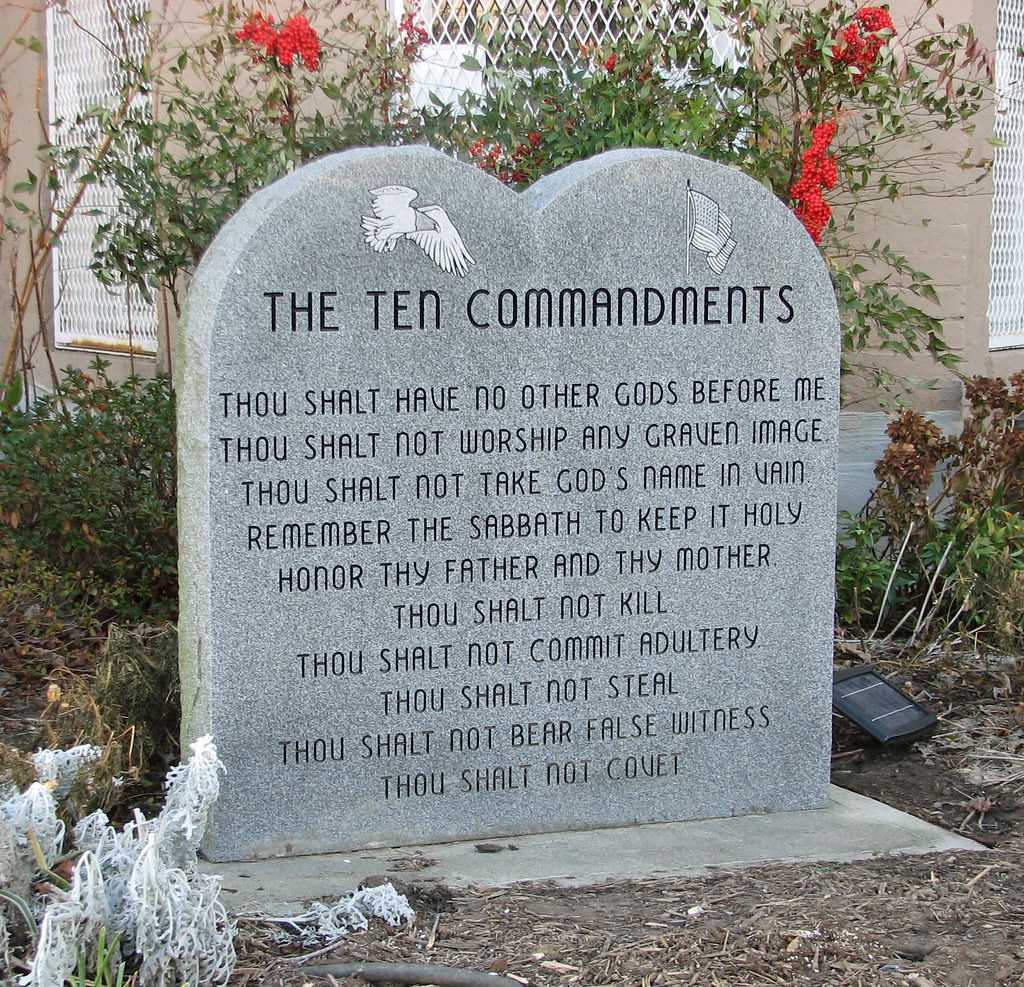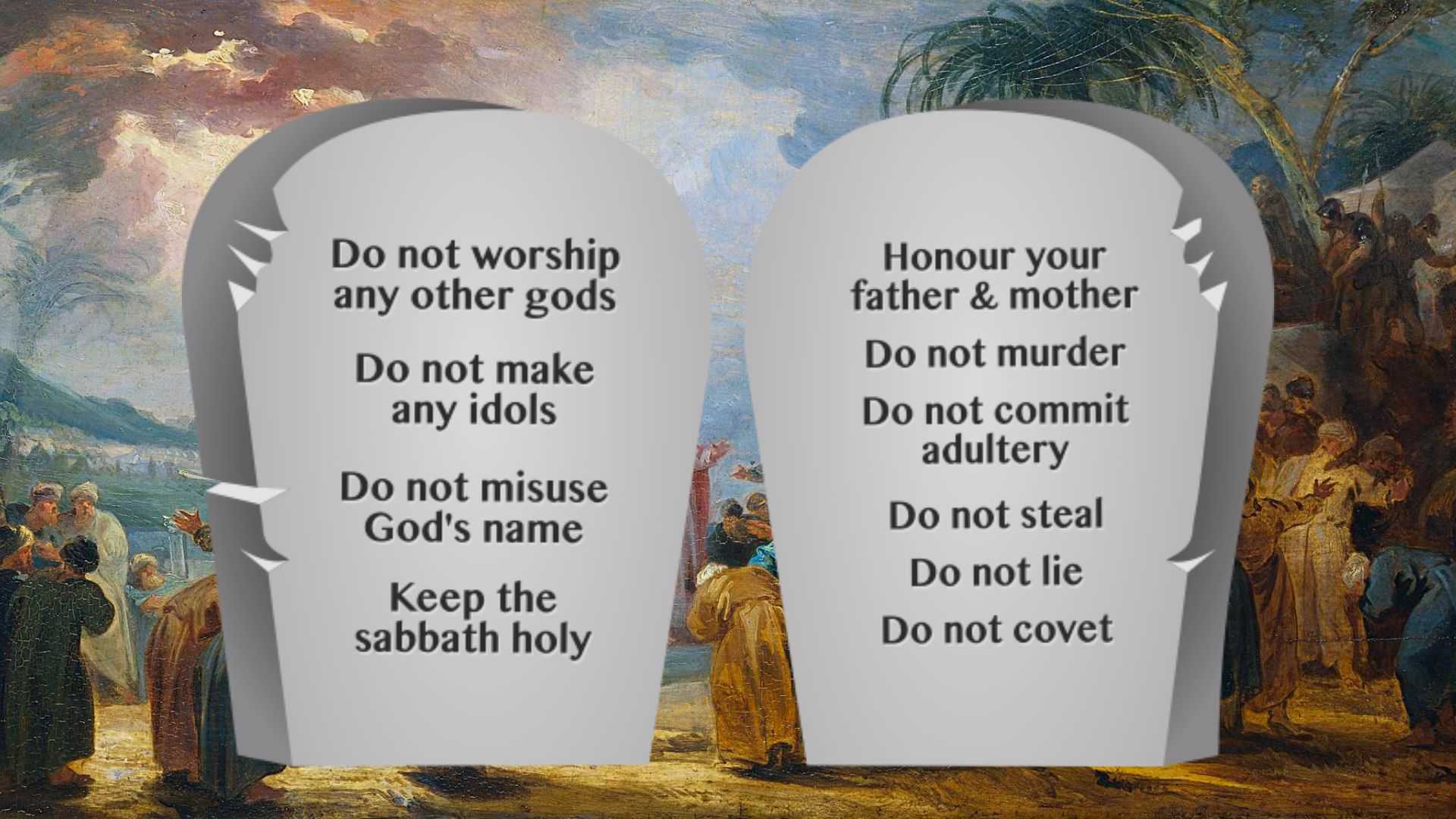10 Commandments in Islam: Since Islam holds that the Bible has been corrupted over time and does not accept the total authority of the Bible, it does not accept the authority of the Ten Commandments as they are listed in the Bible. Islam does, however, acknowledge the prophethood of both Moses and Jesus, therefore the commandments are also not entirely disregarded. so are the 10 Commandments in Islam the same as the 10 Commandments in the Bible & Torah? Let’s learn more about the 10 Commandments in Islam in this article.
The Ten Commandments
Judaism and Christianity both place a strong emphasis on the Ten Commandments, often known as the “Decalogue” and found in the Torah’s book of Exodus. The Bible’s Old Testament has them three times: in Exodus 20:1–17, Exodus 34:14–38, and Deuteronomy 5:5–21. Those verses claim that Moses received the Ten Commandments from God on Mount Sinai and they were inscribed on two stone tablets.
The Ten Commandments are essentially a summary of the agreement between God and the Israelites, and they can be considered the pillars upon which each of those religions was built. What, therefore, does Islam say about the 10 commandments?

The 10 Commandments in Islam
Prophet Muhammad (PBUH) and the Islamic scholars claimed that Islam was a reformation of Christianity and Judaism when they claimed their portion of the Abrahamic religions. They said that the Abrahamic faith had been reformatted by Islam to return to the true monotheism that both Jews and Christians had long since neglected.
The legitimacy of the theology, the main issue raised by the explosive growth of the Islamic faith in the 7th and 8th century CE, had been a significant matter thoroughly researched by Jewish and Christian intellectuals for years before to Prophet Muhammad. Particularly, scholars believed that Paul’s interpretation of Christianity had deviated excessively from the original monotheistic; in fact, one extreme viewpoint said that Pauline theology was moving closer and closer to paganism. These debates were revived with the development of Islam, and new sects like Karaism, an Arabic/Jewish group that appeared in the latter half of the eighth century CE.
The age of the Ten Commandments was one query raised by Islam. Did the Patriarchs prior to Moses follow God’s commandments?
The Quranic version of the Ten Commandments
Twice in the Qur’an, the Ten Commandments are mentioned. According to Quran Book 7:142–5, Moses received the divine tablets. but makes no mention of what was on them.
“And We ordained laws for him in the tablets in all matters, both commanding and explaining all things, (and said): ‘Take and hold these with firmness and enjoin thy people to hold fast by the best in the precepts’…” (Quran 7:142–5)
The other, in Book 2, says:
“Remember when we made a covenant with the children of Israel: You shall not serve any save God, and to be good to parents, and the near kinsman, and to orphans, and the needy, and speak good to all people, and perform the prayer, and pay the alms.” (Quran 2:83–4)
The 10 Commandments comparison in Islam and Judaism
In the end, Muslims aren’t concerned about what was written on those tablets because the Quran is the best representation of divine law. Early and classic Muslim scholars explored the idea that the Israelites broke the Covenant made at Sinai and speculated as to what the tablets were composed of. Although there are significant connections between the Qur’anic commandments and the Jewish Ten Commandments, the Qur’anic commandments are contained in Quran 6:151–153. They are not exactly the same but have parallels.
The message conveyed to the prophet Muhammad is identical to the Ten Commandments as they are presented here. See the table below.
Comparison of 10 Commandments
| 10 Commandments in Christianity/ Judaism | 10 Commandments in Islam |
|---|---|
| 1. Thou shall not take any God except one God. | 1. “There is no other god beside GOD,” (47:19) |
| 2. Thou shall make no image of God. | 2. There is nothing that equals (like) Him. (42:11) “My Lord, make this a peaceful land, and protect me and my children from worshiping idols. (14:35) |
| 3. Thou shall not use God’s name in vain. | 3. Do not subject GOD’s name to your casual swearing, that you may appear righteous, pious, or to attain credibility among the people. (2:224) |
| 4. Thou shall honor thy mother and father. | 4. …..and your parents shall be honored. As long as one or both of them live, you shall never say to them, “Uff” (the slightest gesture of annoyance), nor shall you shout at them; you shall treat them amicably. (17:23) |
| 5. Thou shall not steal. | 5. The thief, male or female, you shall mark their hands as a punishment for their crime, and to serve as an example from GOD. GOD is Almighty, Most Wise. (5:38 – 39) |
| 6. Thou shall not lie or give false testimony. | 6. …… incur GOD’s condemnation upon him, if he was lying. (24:7) Do not withhold any testimony by concealing what you had witnessed. Anyone who withholds a testimony is sinful at heart. (2:283) |
| 7. Thou shall not kill. | 7. ….anyone who murders any person who had not committed murder or horrendous crimes, it shall be as if he murdered all the people. (5:32) |
| 8. Thou shall not commit adultery. | 8. You shall not commit adultery; it is a gross sin, and an evil behavior. (17:32) |
| 9. Thou shall not covet thy neighbors wife or possessions. | 9. You shall regard the parents, the relatives, the orphans, the poor, the related neighbor, the unrelated neighbor, the close associate, the traveling alien, and your servants. (4:36) |
| 10. Thou shall keep the Sabbath holy. | The Sabbath was relinquished with the revelation of the Quran. The Sabbath Abrogated [16:124] The Sabbath was decreed only for those who ended up disputing it (Jews & Christians). Your Lord is the One who will judge them on the Day of Resurrection regarding their disputes. God, however, ordered us to make every effort and drop all businesses to attend the congregational (Friday) prayer. The Submitters may tend to their business during the rest of the day. 10. O you who believe, when the Congregational Prayer (Salat Al-Jumu`ah) is announced on Friday, you shall hasten to the commemoration of GOD, and drop all business. . (62:9) |
Islam does, however, have its own versions of many of the fundamental prohibitions listed in the Ten Commandments, even though it doesn’t precisely have its own “Ten Commandments.” They believe the Bible is a previous revelation of God, hence they don’t have any issues with things like the commandments being displayed in public places. However, because they reject the Bible’s absolute authority, as was stated above, they are unlikely to consider such displays as a religious obligation or requirement.
This was all about the 10 Commandments in Islam. Read more Islamic Blogs or Follow us on social media for daily Islamic reminders.






